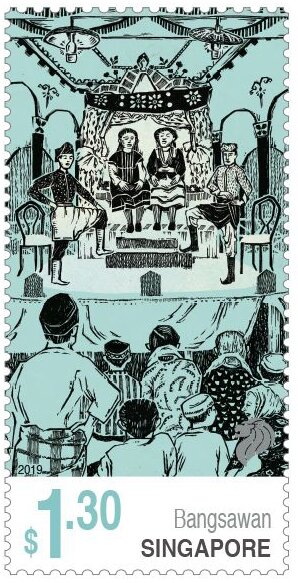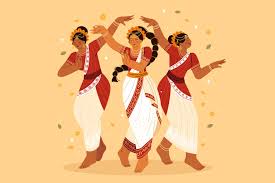Stamp: Bangsawan (Singapore 2019)
Bangsawan (Singapore 2019)
18 July (Singapore ) within release Traditional Entertainment (2019) goes into circulation Stamp Bangsawan face value 1.30 Singapore dollar
| Stamp Bangsawan in catalogues | |
|---|---|
| Colnect codes: | Col: SG 2019-08D |
Stamp is vertical format.
Also in the issue Traditional Entertainment (2019):
- Stamp - Cinema on Wheels face value 90;
- Stamp - Street Story-Telling face value 1st;
- Stamp - Bangsawan face value 1.30;
- Stamp - Puppet Show face value 70;
|
Data entry completed
83%
|
|
|---|---|
| Stamp Bangsawan in digits | |
| Country: | Singapore |
| Date: | 2019-07-18 |
| Size: | 24 x 48 |
| Perforation: | 13 |
| Emission: | Commemorative |
| Format: | Stamp |
| Face Value: | 1.30 Singapore dollar |
Stamp Bangsawan it reflects the thematic directions:
Theatre or theater is a collaborative form of performing art that uses live performers, usually actors or actresses, to present the experience of a real or imagined event before a live audience in a specific place, often a stage. The performers may communicate this experience to the audience through combinations of gesture, speech, song, music, and dance. It is the oldest form of drama, though live theatre has now been joined by modern recorded forms. Elements of art, such as painted scenery and stagecraft such as lighting are used to enhance the physicality, presence and immediacy of the experience. Places, normally buildings, where performances regularly take place are also called "theatres" (or "theaters"), as derived from the Ancient Greek θέατρον (théatron, "a place for viewing"), itself from θεάομαι (theáomai, "to see", "to watch", "to observe").
A tradition is a system of beliefs or behaviors (folk custom) passed down within a group of people or society with symbolic meaning or special significance with origins in the past. A component of cultural expressions and folklore, common examples include holidays or impractical but socially meaningful clothes (like lawyers' wigs or military officers' spurs), but the idea has also been applied to social norms and behaviors such as greetings, etc. Traditions can persist and evolve for thousands of years— the word tradition itself derives from the Latin word tradere literally meaning to transmit, to hand over, to give for safekeeping. While it is reportedly assumed that traditions have an ancient history, many traditions have been invented on purpose, whether it be political or cultural, over short periods of time. Various academic disciplines also use the word in a variety of ways.


